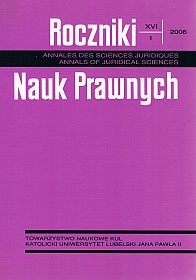Interpretation of the Constitutional Rule of Free Education
Abstract
The right to education belongs to the fundamental rights of an individual in the contemporary society. Maintaining and development of the society's potential depends on realization of this right. Hence, the right to education should be perceived not only as an individual value, but also as an important good of the whole society. The universal dimension of the right to education is stressed by international documents on human rights, in this way effecting standardization of defining the rights of an individual also on the national level. The Constitution of the Republic of Poland of 1997 in Art. 70 recognizes the right of every citizen to education, at the same time pointing to the public authorities' duty to secure general and equal access to education for all the citizens. One of the ways of implementing the rules of general and equal access to education is the constitutional rule of educational performances being free. Hence, the rule of free education plays the role of a subsidiary means to achieve the aim, which is a general and equal access to education. As an exception, the constitution allows the possibility of introducing paid education in higher education institutions. However, this only concerns public institutions and it cannot include all educational performances. Introducing a fee is possible by way of an act, and its amount is limited by the legal order. In the interpretation decision of the Constitutional Tribunal it was said that it is permissible to introduce fees in public higher education institutions in the range and amount that is indispensable because of the costs of education.
Copyright (c) 2006 Roczniki Nauk Prawnych

This work is licensed under a Creative Commons Attribution-NonCommercial-NoDerivatives 4.0 International License.


